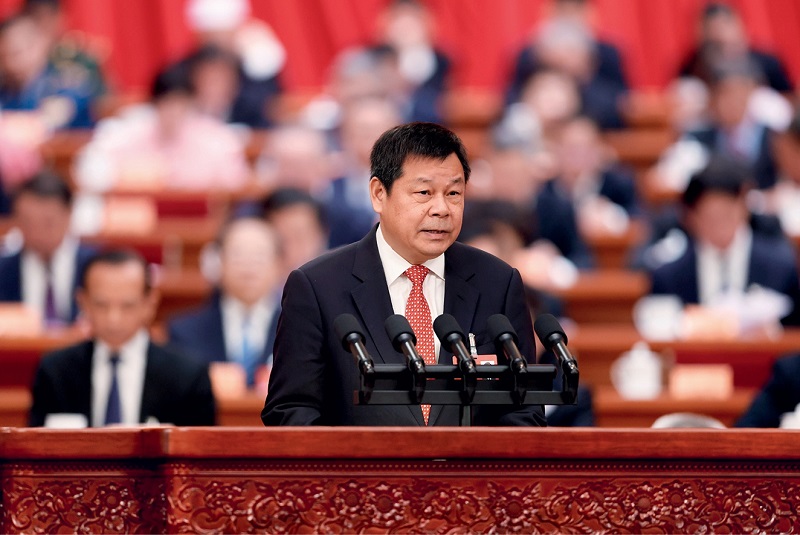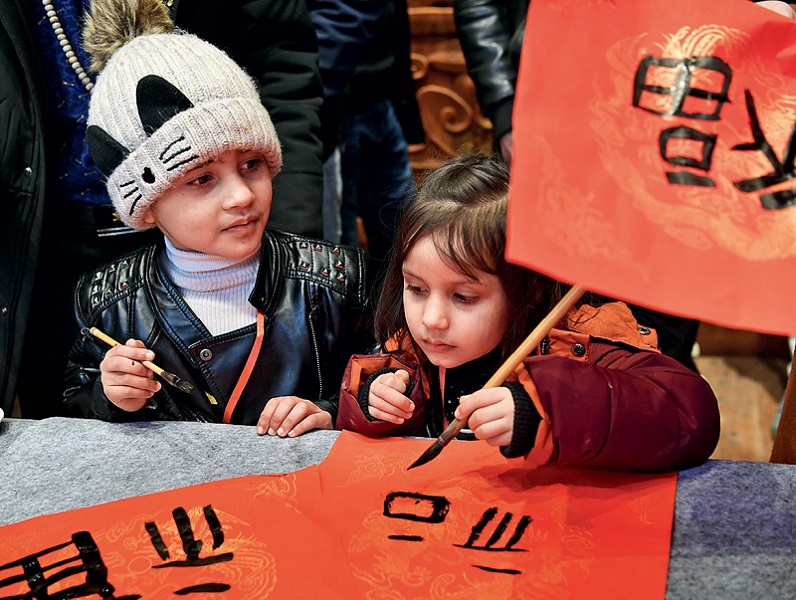Du Zhanyuan, Standing Committee member of the 14th CPPCC National Committee and CICG president, on how to tell engaging stories about China.

Du Zhanyuan speaks on building a more effective international communication system and enhancing China’s cultural influence at the third session of the 14th National Committee of the Chinese People's Political Consultative Conference (CPPCC) at the Great Hall of the People in Beijing on March 9, 2025.
As changes unseen in a century accelerate across the world, cultural exchange and mutual learning between civilizations are becoming increasingly important. The Chinese government declared in its 2025 work report that China will “pursue broader international people-to-people exchanges and cooperation and make our international communication more effective,” charting a clear direction for telling compelling stories about China and making China’s voice better heard under the new circumstances. This effort will inject new impetus into the building of a community with a shared future for humanity.
How can we innovate international communication approaches, improve transmission efficacy, and present a real, multi-dimensional, and panoramic view of China to a global audience? China Today sat down with Du Zhanyuan, a member of the Standing Committee of the 14th National Committee of the Chinese People’s Political Consultative Conference (CPPCC) and president of China International Communications Group (CICG), for his views.
Governance Philosophy
Today, global governance and international cooperation are facing numerous challenges. China has transitioned from a poor, backward country to the world’s second-largest economy, achieving rapid economic growth while maintaining long-term social stability — a momentum that has sustained for over four decades. “This has attracted the attention of the international community to China’s governing philosophy and practices. There is an urgent desire out there to understand the ‘secrets’ to China’s development and stability, with the hope of drawing lessons from them to address the challenges facing humanity. This has also posed new tasks for and placed new requirements on our work as an international communication group,” Du told China Today.
According to him, to better share China’s development philosophy, governance experience, and global contributions with the world, CICG has been compiling, publishing, and distributing works by the Chinese president such as Xi Jinping: The Governance of China since 2014, which have attracted broad attention and positive feedback from readers abroad.
To date, Xi Jinping: The Governance of China and other works of President Xi have been published in 43 languages, covering over 180 countries and regions. They are available now on over 500 overseas digital reading platforms and can be found in nearly 1,700 libraries — including national, university, and public libraries — in 171 countries and regions. These works represent the most extensively translated, widely distributed, and influential collection of a leader’s writings in the world today. They serve as an open window for the international community to better understand contemporary China.
Du emphasized that to tell China’s stories to the world, we must focus on telling the story of President Xi’s governance philosophy and systematically explain Xi Jinping Thought on Socialism with Chinese Characteristics for a New Era. This will help the international community better understand the Communist Party of China (CPC), China, and the new era of China’s development.

Two children learn to write the Chinese character fu, meaning blessing, during an event in the ancient city of Langzhong in Sichuan Province to welcome the Spring Festival.
People-to-People Exchanges
The ancient Chinese philosopher Han Fei once said, “Diplomatic relations between nations rest on mutual understanding and affinity between their people,” indicating the importance of cultural exchange between ordinary people. Since the advent of the new era of China’s development, President Xi has proposed a new vision of civilization and articulated China’s stance on exchanges between civilizations on multiple occasions. “We advocate the importance of inheritance and innovation of civilizations. Countries need to fully harness the relevance of their histories and cultures to the present times, and push for creative transformation and innovative development of their fine traditional cultures,” he said at an international event.
In March 2023, he put forward the Global Civilization Initiative, China’s vision to foster inclusive coexistence and exchanges among diverse civilizations.
According to Du, in recent years, China has significantly expanded people-to-people exchanges with other countries, especially Global South countries, achieving remarkable progress in cultural, educational, scientific, and economic sectors. These exchanges have become a vital force in advancing bilateral and multilateral relations, deepening mutual understanding and friendship, and injecting fresh momentum into cultural exchanges and integration worldwide.
He pointed out that the Chinese civilization, which has a history of over 5,000 years, is the common wealth of humanity and a source of inspiration for global governance. China’s contemporary development should be combined with its fine traditional culture to tell compelling stories about the reform and development of contemporary China, showing the contemporary relevance and global significance of the Chinese path to modernization. With a strong sense of responsibility as a major country, China provides solutions to common challenges faced by mankind, such as climate change and artificial intelligence governance. The concept of a community with a shared future for mankind must be upheld, the mechanism for implementing the Global Civilization Initiative improved, and cultural soft power and influence enhanced through exchanges and mutual learning between civilizations.
With the advancements in globalization, mutual understanding between Chinese and peoples of other countries has become particularly important. “CICG has taken a series of innovative measures to create an international exchange and dialogue platform. One of them is initiating the Orchid Awards for the international exchange of Chinese culture. Currently, work for the second Orchid Awards is under way to attract and inspire more foreign friends to participate in promoting cultural exchange and mutual learning,” Du said.
CICG has also implemented the International Communication Project of Chinese Civilization to promote the overseas publication of Chinese books, strengthen cultural exchanges, and promote the development of cultural trade. With a focus on domestic governance, global governance, cultural dialogue, and youth exchange, it has created an exchange platform. In 2024 alone, CICG held more than 100 international cultural exchange events at home and abroad, with over 10,000 guests participating. The BRICS Seminar on Governance & Cultural Exchange Forum 2024, China-France Civilization Exchange and Mutual Inspiration Dialogue, the Beijing-Tokyo Forum, and the 2024 Forum on Dialogue between the Civilizations of China and Latin America and the Caribbean have all evolved into regular mechanisms, providing more channels for overseas audiences to learn about Chinese culture.

A tourist poses for photos in the Yuyuan Garden Mall in Shanghai on January 27, 2025.
Application of New Technologies
President Xi Jinping has repeatedly emphasized the need to utilize new technologies, especially artificial intelligence (AI) and big data, to enhance the effectiveness of international communication.
AI is profoundly changing human society. In the field of international communication, the ability to apply large language models (LLMs) has become an important factor in improving work efficiency and national cultural competitiveness. Du suggested that comprehensive support for the use of AI in the field of international communication should be increased at the national level. Meanwhile, the state should make targeted efforts to increase guidance and support for the technical capacity building of international communication organizations, fill in the gaps in infrastructure and talent, promote collaboration between those organizations with technology companies and research institutions, and build an LLM suitable for international communication with China’s own technology.
From the perspective of translation, the development of AI has created new opportunities as well as challenges. With the rapid development of LLMs, new requirements have emerged, such as the reconstruction of human-machine collaborative workflows and the optimization of talent training structures. These advances have significantly improved the efficiency of human translators. “The multilingual translation platform jointly developed by CICG and other institutions can provide translation services for different application scenarios through pretrained language models and accurate and reliable data, facilitating development of the Belt and Road Initiative,” he said.
However, any new technology is a double-edged sword. While improving information production efficiency, AI also makes it difficult to detect the ever-growing false information, causing the “information cocoon effect” that influences the international eco-system of public opinion. To deal with it, Du said, China needs to improve digital governance abilities and amplify the positive effects brought by the application of new technologies. He emphasized the need to adapt to the trend and strengthen the integration and development of international communication and technological innovation through better planning, comprehensive measures, and cooperation by all stakeholders. International communication capabilities should also be enhanced to create a favorable external environment for China’s national development and rejuvenation. 
In recent years, China has significantly expanded people-to-people exchanges. These exchanges have become a vital force in advancing bilateral and multilateral relations.